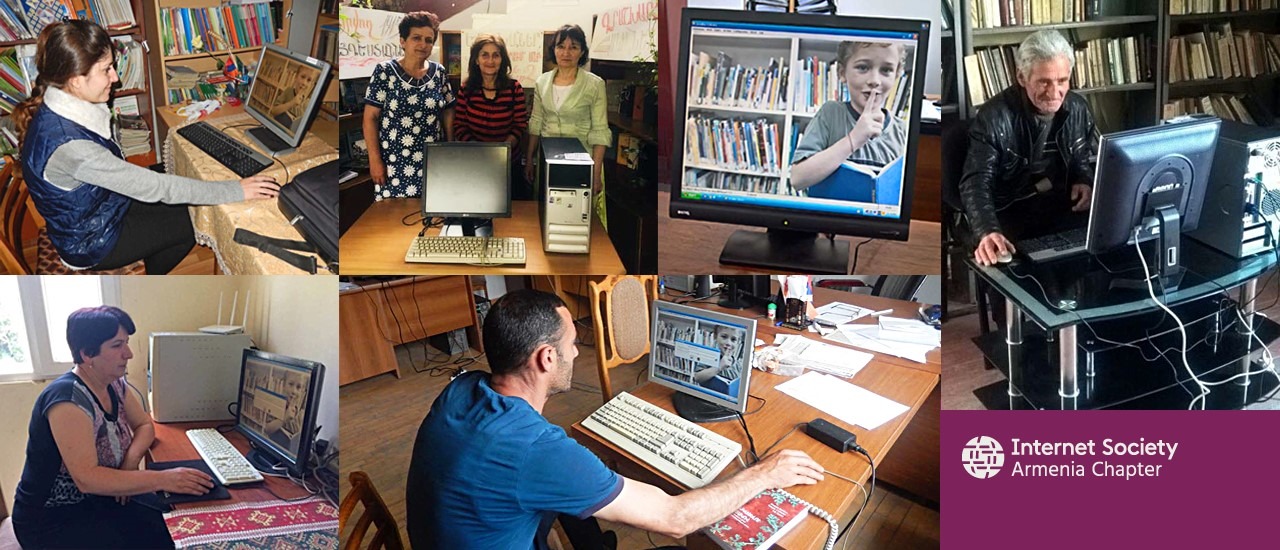Although there are a large number of rural libraries in Armenia, the majority of them do not have computers or Internet access. Librarians are forced to deal with manual book circulation and lack of management programs. Residents are mostly unaware of the resources housed in the libraries. It became evident that libraries needed a technological shift to break from their current working routines and embrace change.
In 2015, The Internet Society Armenia Chapter started a pilot project to provide rural libraries with computers, software and training. The project team installed 20 computers with library management programs and estimated that, in order to cover all libraries, they needed to reach the number of about 1,000 computers.
In 2017, the Chapter started Computers, services and Wi-Fi Internet for rural libraries, a project supported by the Internet Society Beyond the Net Funding Programme, that aimed to install more computers to improve the librarians operation and provide lightweight library management programs as well as WiFi access for visitors. The project was presented at the national IGF on October 10, 2018.
 Igor Mkrtumyan, President of the Armenia Chapter, explains how their project is helping to address the needs of rural communities within the global context of the Sustainable Development Goals (SDGs) 4 (Quality Education) and 10 (Reduced Inequalities).
Igor Mkrtumyan, President of the Armenia Chapter, explains how their project is helping to address the needs of rural communities within the global context of the Sustainable Development Goals (SDGs) 4 (Quality Education) and 10 (Reduced Inequalities).
“During the first stage of the project we installed 50 computers and trained 50 librarians.” says Igor. “The computers are equipped with lightweight library management programs that allow to subscribe members, register books, organize the book circulation, search requested books, track the movement of books and control the books check-in and check-out as well as quickly receive any required information. Each computer donation is certified by a contract signed by library authorities. By the end of the project we had 16 Wi-Fi routers installed, 120 computers equipped with library management programs, 200 hours spent on software installations and 70 librarians trained.”
What kind of training did you provide?
“The library management program we developed is very easy to install and has a simple interface, as well as an inviting setting for the users. We provided training sessions and workshops. We repaired 33 computers and spent 190 hours for software installation and training. We also provided IT services, as many rural libraries need not only to learn the library management software, but also the basics of operating systems and computer hardware to be able to solve minor problems.”
What was the mayor problem and how did you solve it?
“The major problem in rural areas is the absence of computer service skills. Very often libraries, even having computers, stop using them when problems arise. It was clear that they also needed help in troubleshooting and repair, operating system and applications installation. Providing the installed systems with support services is a matter of primary importance. We developed a method using Teamviewer, a remote support desktop tool. We have constant phone contact with librarians and try to respond to their needs as soon as possible. Each day we are receiving 3-4 phone calls and assisting rural libraries with Teamviewer sessions.”
How the community responded and how will you continue the project in the future?
“The rural community is excited about the project and there is an ever-growing demand. Thanks to the grant received from the Internet Society and the notable achieved results, we are now able to continue the project with the support of the “Armenian Internet Registry” that is now funding us to further work with libraries on their development.”
We’re looking for new ideas from people all over the world on how you can empower your community using the Internet. The Beyond the Net Funding Programme funds projects up to $30,000.

